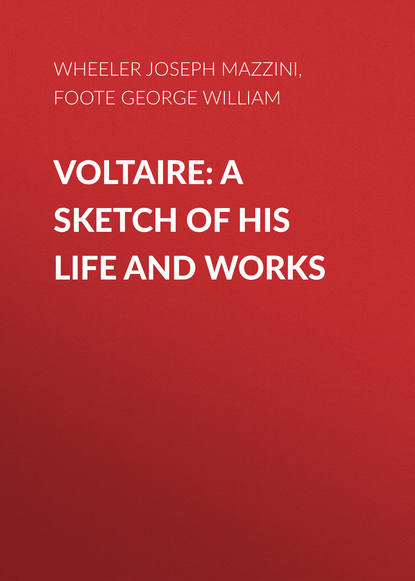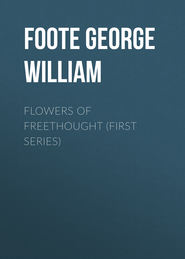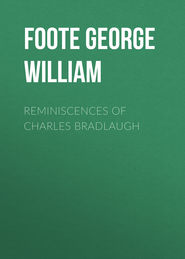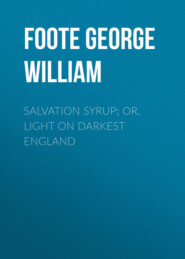По всем вопросам обращайтесь на: info@litportal.ru
(©) 2003-2024.
✖
Voltaire: A Sketch of His Life and Works
Настройки чтения
Размер шрифта
Высота строк
Поля
Colonel Hamley wrote: “But after the winnowings of generations, a wide and deep repute still remains to him; nor will any diminution which it may have suffered be without compensation, for, with the fading of old prejudices, and with better knowledge, his name will be regarded with increased liking and respect. Yet it must not be supposed that he is here held up as a pattern man. He was, indeed, an infinitely better one than the religious bigots of that time. He believed, with far better effect on his practice than they could boast, in a Supreme Ruler. He was the untiring and eloquent advocate at the bar of the universe of the rights of humanity.”
Mr. Swinburne has well expressed this characteristic. “Voltaire’s great work,” he says, “was to have done more than any other man on record to make the instinct of cruelty not only detestable, but ludicrous; and so to accomplish what the holiest and the wisest of saints and philosophers had failed to achieve: to attack the most hideous and pernicious of human vices with a more effective weapon than preaching and denunciation: to make tyrants and torturers look not merely horrible and hateful, but pitiful and ridiculous.”
Edgar Quinet, in his lectures on the Church, says: “I watch for forty years the reign of one man who is himself the spiritual direction, not of his country, but of his age. From the corner of his chamber he governs the realm of mind. Everyday intellects are regulated by his; one word written by his hand traverses Europe. Princes love and kings fear him. Nations repeat the words that fall from his pen. Who exercises this incredible power which has nowhere been seen since the Middle Ages? Is he another Gregory VII? Is he a Pope? No – Voltaire.”
And Lamartine, in similar strain, remarks: “If we judge of men by what they have done, then Voltaire is incontestibly the greatest writer of modern Europe. No one has caused, through the powerful influence of his genius alone and the perseverance of his will, so great a commotion in the minds of men. His pen aroused a sleeping world, and shook a far mightier empire than that of Charlemagne, the European empire of a theocracy. His genius was not force, but light. Heaven had destined him not to destroy, but to illuminate; and wherever he trod, light followed him, for Reason – which is light – had destined him to be, first her poet, then her apostle, and lastly her idol.”
Mr. Alexander A. Knox, writing in the Nineteenth Century (October 1882), says: “That the man’s aspirations were in the main noble and honorable to humanity, I am sure. I am equally so that few men have exercised so great an influence upon their fellow creatures… The wonderful old man! When he was past eighty years of age he set to work, like another Jeremy Bentham, to abolish the admission of hearsay evidence into French legal proceedings. But his great work was that by his wit and irony he broke down the principle of authority which had been so foully abused in France. Would the most strictly religious man wish to see religion as it was in France in the eighteenth century? Would the greatest stickler for authority wish to find a country governed as France was governed in the days of Voltaire?”
Du Bois-Reymond, the eminent German scientist, remarks: “Voltaire is so little to us at present because the things he fought for, ‘toleration, spiritual freedom, human dignity, justice,' have become, as it were, the air we breathe, and do not think of except when we are deprived of it.”
Col. R. G. Ingersoll, in his fine Oration on Voltaire, observes: “Voltaire was perfectly equipped for his work. A perfect master of the French language, knowing all its moods, tenses, and declinations – in fact and in feeling playing upon it as skilfully as Paganini on his violin, finding expression for every thought and fancy, writing on the most serious subjects with the gaiety of a harlequin, plucking jests from the mouth of death, graceful as the waving of willows, dealing in double meanings that covered the asp with flowers and flattery, master of satire and compliment, mingling them often in the same line, always interested himself, therefore interesting others, handling thoughts, questions, subjects as a juggler does balls, keeping them in the air with perfect ease, dressing old words in new meanings, charming, grotesque, pathetic, mingling mirth with tears, wit and wisdom, and sometimes wickedness, logic and laughter. With a woman’s instinct, knowing the sensitive nerves – just where to touch – hating arrogance of place, the stupidity, of the solemn, snatching masks from priest and king, knowing the springs of action and ambition’s ends, perfectly familiar with the great world, the intimate of kings and their favorites, sympathising with the oppressed and imprisoned, with the unfortunate and poor, hating tyranny, despising superstition, and loving liberty with all his heart. Such was Voltaire, writing Œdipus at seventeen, Irène at eighty-three, and crowding between these two tragedies the accomplishment of a thousand lives.”
The Right Hon. John Morley testifies: “Voltaire was the very eye of modern illumination. It was he who conveyed to his generation in a multitude of forms the consciousness at once of the power and the rights of human intelligence. Another might well have said of him what he magnanimously said of his famous contemporary, Montesquieu, that humanity had lost its title-deeds, and he had recovered them. The four-score volumes which he wrote are the monument, as they were the instrument, of a new renascence. They are the fruit and representation of a spirit of encyclopaedic curiosity and productiveness. Hardly a page of all these countless leaves is common form. Hardly a sentence is there which did not come forth alive from Voltaire’s own mind, or which was said because some one else had said it before. Voltaire was a stupendous power, not only because his expression was incomparably lucid, or even because his sight was exquisitely keen and clear, but because he saw many new things, after which the spirits of others were unconsciously groping and dumbly yearning. Nor was this all. Voltaire was ever in the front and centre of the fight. His life was not a mere chapter in a history of literature. He never counted truth a treasure to be discreetly hidden in a napkin. He made it a perpetual war cry, and emblazoned it on a banner that was many a time rent, but was never out of the field.” We may fitly conclude with Browning’s incisive lines in The Two Poets of Croisie: —
“Ay, sharpest, shrewdest steel that ever stabbed
To death Imposture through the armour joints.”
SELECTIONS FROM VOLTAIRE’S WORKS
History
The world is old, but history is of yesterday. —Mélanges Historiques.
If you would put to profit the present time, one must not spend his life in propagating ancient fables. —Ibid.
A mature man who has serious business does not repeat the tales of his nurse. —Ibid.
Search through all nations and you will not find one whose history does not begin with stories worthy of the Four Sons of Aymon and of Robert the Devil. —Politique et Legislation.
Ancient histories are enigmas proposed by antiquity to posterity, which understands them not —Dict. Phil. (Art. “Histoire”).
A real fact is of more value than a hundred antitheses. —Melanges Historiques.
I have a droll idea. It is that only people who have written tragedies can throw interest into our dry and barbarous history. There is necessary in a history, as in a drama, exposition, knotty plot, and dénouement, with agreeable episode. —Corr. gén. 1740.
They have made but the history of the kings, not that of the nation. It seems that during fourteen hundred years there were only kings, ministers, and generals among the Gauls. But our morals, our laws, our customs, our intelligence – are these then nothing? —Corr., 1740.
Is fraud sanctified by being antiquated? —Sottisier.
I have ever esteemed it charlatanry to paint, other than by facts, public men with whom we have had no connection. —Corr. gen., 1752.
If one surveys the history of the world, one finds weaknesses punished, but great crimes fortunate, and the world is a vast scene of brigandages abandoned to fortune. —Essai sur les Mœurs, c. 191.
Since the ancient Romans, I have known no nation enriched by victories. —Contant d' Orville, i. 337.
To buy peace from an enemy is to furnish him with the sinews of war. —Ibid, p. 334.
The grand art of surprising, killing, and robbing is a heroism of the highest antiquity. —Dial. 24.
Murderers are punished, unless they kill in grand company to the sound of trumpets; that is the rule. —Dict. Phil. (Art. “Droit”).
We formerly made war in order to eat; but in the long run, all the admirable institutions degenerate. —Dial. 24.
It suffices often that a mad Minister of State shall have bitten another Minister for the rabies to be communicated in a few months to five hundred thousand men. —Ibid.
In this world there (are) only offensive wars; defensive ones are only resistance to armed robbers. —Ibid.
Twenty volumes in folio never yet made a revolution. It is the portable little shilling books that are to be feared. If the Gospel cost twelve hundred sesterces, the Christian religion would never have been established. —Correspondence with D1 Alembert, 1765.
Wars
C.: What, you do not admit there are just wars?
A.: I have never known any of the kind; to me it appears contradictory and impossible.
C.: What! when the Pope Alexander VI. and his infamous son Borgia pillaged the Roman States, strangled and poisoned the lords of the land, while according them indulgences: was it not permissible to arm against these monsters?
A.: Do you not see that it was these monsters who made war? Those who defended themselves from aggression but sustained it. There are constantly only offensive wars in this world; the defensive is nothing but resistance to armed robbers.
C.: You mock us. Two princes dispute an heritage, their right is litigious, their reasons equally plausible; it is necessary then that war should decide, and this war is just on both sides.
A.: It is you who mock. It is physically impossible that both are right, and it is absurd and barbarous that the people should perish because one of these two princes has reasoned badly. Let them fight together in a closed field if they wish, but that an entire people should be sacrificed to their interests, there is the horror. —l' A.B.C.
Politics
They have discovered in their fine politics the art of causing those to die of hunger who, by cultivating the earth, give the means of life to others. —Sottisier.
Society has been too long like a game of cards, where the rogues cheat the dupes, while sensible people dare not warn the losers that they are deceived. —Questions sur les Miracles.
They have only inculcated belief in absurdities to men in order to subdue them. —Ibid.
The most tolerable of all governments is doubtless the republican, since that approaches the nearest towards natural equality. —Idées Républicaines.
A Republican is ever more attached to his country than a subject to his, for the same reason that one loves better his own possessions than those of a master. —Pensées sur le Gouvernement.
Give too much power to anybody and be sure they will abuse it. Were the monks of La Trappe spread throughout the world, let them confess princesses, educate youth, preach and write, and in about ten years they would be similar to the Jesuits, and it would be necessary to repress them. —Mél. Balance Egale.
What are politics beyond the art of lying a propos? —Contant D'Orville.
“Reasons of State” is a phrase invented to serve as excuse for tyrants. —Commentaire sur le traité des Délits.
The best government is that where there are the fewest useless men. – Dial. 4.
Man is born free. The best government is that which most preserves to each mortal this gift of nature. —Histoire de Russie.
To be free, to have only equals, is the true life, the natural life of man; all other is an unworthy artifice, a poor comedy, where one plays the rôle of master, the other of slave, this one a parasite, and that other a pander. —Dial. 24.











